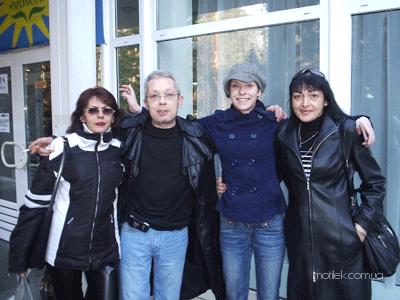On his Web blog Pavel Kutsev, leader of the organization Drop-In Center, continues discussing controversial issues related to the Ukrainian harm reduction movement.
A few months ago, Pavel wrote about a decision made by the Donetsk city council to prohibit methadone programs in municipal medical establishments. In his recent post, he analyzes the origins of the city's decision, and what actions the harm reduction community can take to prevent a repeat of this scenario in other cities.

Drop-In Center activists
At the beginning of his entry, Pavel posts a summary of a message he received from a friend in Donetsk. The message reads:
I know a lot about the municipal methadone site that was closed. You just can’t imagine what a mess it was. Almost all the patients took methadone out of the hospital. Some people then sold it and some injected it intravenously. Often people injected in a park right next to the methadone site, which, by the way, is located not far from a police station. The buyers of “smuggled” methadone would wait in cars nearby…
After the municipal site closed, the patients were transferred to medical establishments belonging to the central government. This is where the author of the message received substitution therapy treatment. He goes on to say:
The nurses from our site have caught up to 10 patients who were trying to take methadone out. They told our nurses that they were allowed to do this at the other site.
Pavel responds to this message in his blog, saying:
There is nothing new for me here. It is just one more fact proving that patients should introduce a proper order themselves. I believe that this post just highlights the importance of self organization, self support and self discipline for patients of substitution therapy. I say that the Association of Patients of Substitution Therapy should teach its members how to not to harm themselves.
Pavel thinks that problems in Donetsk occurred because the wrong people were allowed into the substitution therapy program. He argues:
I am positive that if a chronically-addicted person needs medication he will never ever give away his dose. Never! So the issue of selling methadone just would not exist if the right people are selected for the program. If there is a problem of patients selling methadone, it means that the selection commission has shown its professional incompetence. I wouldn't even rule out the idea that all of this was organized by the local powers on purpose to show the “real face” of methadone programs and to give politicians a strong reason to close methadone sites and receive the additional support of voters.
Currently an inter-agency commission, which consists of a chief doctor of a medical establishment, a doctor who is an expert in narcology and a social worker, selects the patients. Pavel questions whether this group of people can adequately select the best patients for the program. He writes:
By the way, this Donetsk nightmare was the result of the inter-agency commission's work. Has anybody ever tested the qualifications of these local “experts” in substitution therapy? Has anybody asked patients to sign an agreement that would set rules they must follow? Has anybody conducted a public awareness campaign for people of the city via mass media to explain the benefits of substitution therapy? I am sure nobody has even thought about this. The grant was received and everything was done according to the law. But besides the legal aspects, there are many other areas you must address if you want to provide substitution therapy.
Has anybody witnessed how “narcologists” conduct these interviews? I personally know a couple of idiots who have become patients of opiate substitution therapy who aren't actually opiate drug users. I have also met people who before coming to the program had tried many types of drugs and had only done a few shots of heroin…
I just do not understand how it is possible, especially when everyone says that it's very hard to get into the program, that the commission often allows totally random people to participate in it. How it possible that the experts cannot distinguish between a chronic drug addict and a person who still stands a good chance to quit drugs?
I just want to conclude that the selection process for substitution therapy programs should be improved. I think that a representative of patients should be included in this inter-agency commission. But unfortunately public health people do not think so…




1 comment
I live in the U.S., and it is very hard for methadone clinics to be opened in our cities because of the stereotypes associated with methadone patients. I must say that when I read how the “patients” were acting at the Donetsk clinic, I cringed at the thought. They are validating the negative stereotypical views held by most societies. I agree with Pavel that the selection process for the patients seems almost non-existent. It is very true that an addicted person is Not going to sell her or his medicine. At the clinics in the U.S., people must take their medicine in front of the nurses every single day until they have proven that they are ready to have some “take-homes,” and even then, it’s only a for a couple of days at a time. This “phasing up” takes a long time and depends upon each individual’s circumstances and progress. There are also security guards that work outside of many clinics to ensure that there is absolutely no loitering. People who are treating methadone as a drug to get high are sabotaging the treatment of those patients who understand that methadone is a God-sent medicine that can help them lead normal, healthy lives. Furthermore, methadone can be very dangerous when people who do not need it treat it as a recreational drug. It is strong medicine that works for the disease of addiction. It actually works.